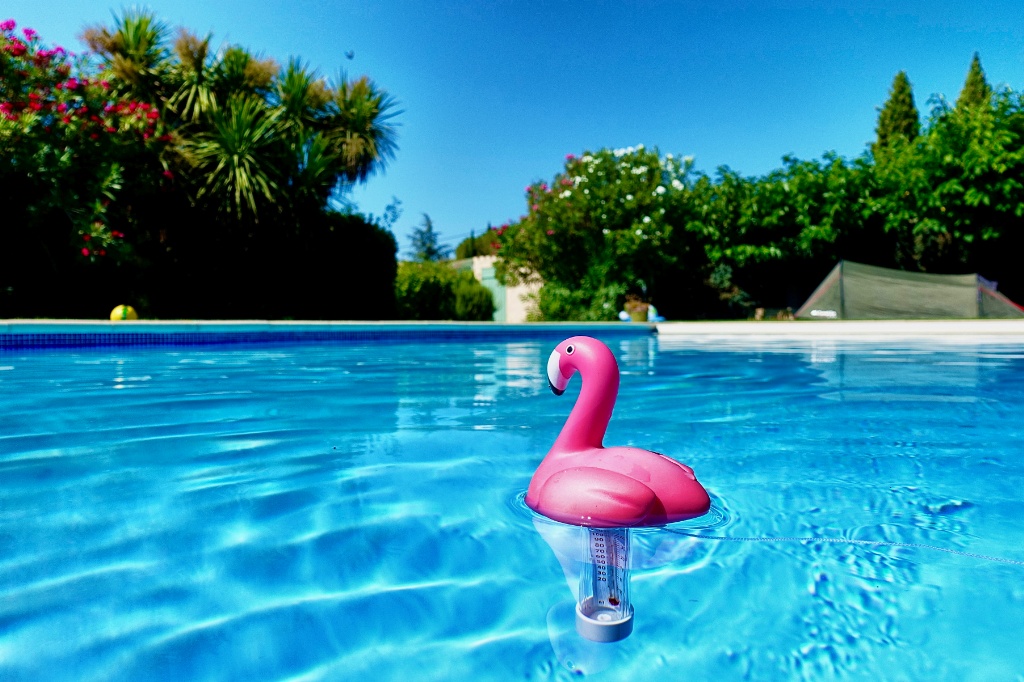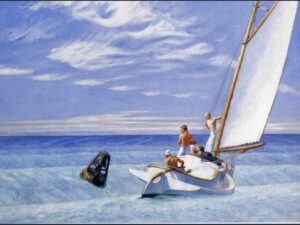My swimming companion

Well, actually, s/he is entirely functional — to monitor the temperature of the water!
Quote of the Day
”Instead of being arrested, as we stated, for kicking his wife down a flight of stairs and hurling a lighted kerosene lamp after her, the Revd James P. Wellman died unmarried four years ago.”
- Anonymous. The best newspaper correction ever. I found it in Geoffrey Madan’s Notebooks.
Musical alternative to the morning’s radio news
Ella Fitzgerald | Blue Moon
Long Read of the Day
Moderation or Death
This is the title of Christopher Hitchins’s magisterial review in the London Review of Booksof Michael Ignatieff’s biography of Isiah Berlin. It came to mind because I was reading Christian Lorentzen’s review-essay in Harper’s on A Hitch in Time: Writings from the London Review of Books, by Christopher Hitchens, which is usefully critical of Hitch’s strange ideological odyssey over the flamboyant course of his life. Lorentzen describes that LRB review as “the most magnificent piece of literary journalism” in the collection, and he’s right, IMO.
Tricked out with Hitchens’s memory of encountering Berlin at Oxford and in the letters pages of the New Statesman, as well as fact-checking accounts from Berlin intimates and rivals, the essay is a tall thirteen-thousand-word cocktail of gossip, flirtation, and jousting with the ghost of a not entirely unsympathetic ideological foe. Hitchens reckons with liberalism and the bargains it makes with violence in the name of liberty.
Hitchins’s review is genuinely long — 12,912 words. So make an appointment with it. And if, like Hitchins, whisky is your poison, keep a glass of it to hand.
When datacentres as well as railways can’t take the heat
Yesterday’s Observer column:
Interestingly, the railway industry was not the only one that couldn’t take the heat. When the temperature reached 40.3C on Tuesday, datacentres operated by Google and Oracle had to be taken offline. According to The Register “Selected [Google] machines were powered off to avoid long-term damage, causing some resources, services, and virtual machines to become unavailable, taking down unlucky websites and the like.” And at 3:41pm Oracle customers received an alert telling them that: “As a result of unseasonal temperatures in the region, a subset of cooling infrastructure within the UK South (London) Data Centre experienced an issue. This led to a subset of our service infrastructure needing to be powered down to prevent uncontrolled hardware failures. This step has been taken with the intention of limiting the potential for any long term impact to our customers.”
None of this will come as a surprise to anyone who has been lucky enough to have visited one of these centres…
My commonplace booklet
Edward Hopper: Ground Swell

I love this painting, but enjoyed even more the commentary on the WikiArt site.
Edward Hopper’s lifelong enthusiasm for the sea developed when he was a boy in Nyack, New York, then a prosperous Hudson River port with an active shipyard. Years later, in 1934, he and his wife built a house and studio in South Truro, Massachusetts, where he produced a number of oil paintings and watercolors manifesting his avid interest in nautical subjects.
Despite its bright palette and seemingly serene subject, Ground Swell echoes the themes of loneliness and escape typical of Hopper’s oeuvre. The blue sky, sun-kissed figures, and vast rolling water strike a calm note in the picture; however, the visible disengagement of the figures from each other and their noticeable preoccupation with the bell buoy placed at the center of the canvas call into question this initial sense of serenity. The lone dark element in a sea of blues and whites, the buoy confronts the small catboat in the middle of an otherwise empty seascape. Its purpose, to emit a warning sound in advance of unseen or imminent danger, renders its presence in the picture ominous. The cirrus clouds in the blue sky—often harbingers of approaching storms—reinforce this sense of disturbance in the otherwise peaceful setting. Although Hopper resisted offering explanations of his paintings, the signs of impending danger here may also reference a more severe disturbance: during the time that Hopper worked on Ground Swell, from August to September 15, 1939, World War II broke out in Europe.
This Blog is also available as a daily email. If you think that might suit you better, why not subscribe? One email a day, Monday through Friday, delivered to your inbox. It’s free, and you can always unsubscribe if you conclude your inbox is full enough already!
